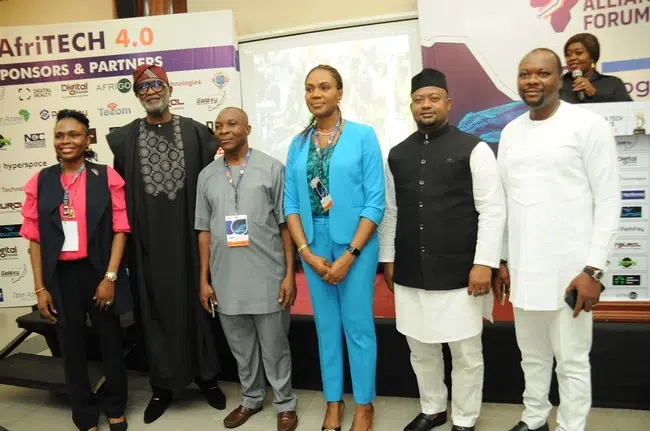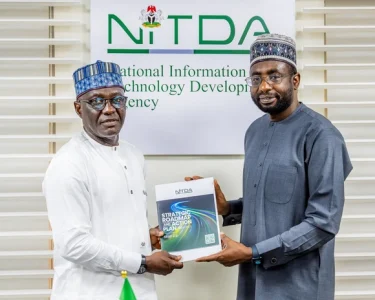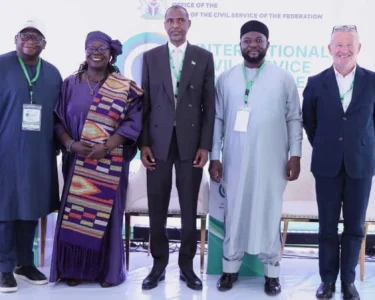Technology experts at the Africa Tech Alliance Forum (AfriTECH 4.0) have highlighted the transformative potential of blockchain and AI in positioning Africa as a global technology leader.
Kashifu Inuwa Abdullahi, the director-general of the National Information Technology Development Agency (NITDA), in his keynote address, titled “Blockchain Technology & AI: Positioning Africa for the Future,” emphasized Africa’s unique position to leverage these technologies for economic and social development.
With mobile penetration at about 80% and a rapidly growing youth population, Africa, he noted, is fertile ground for digital transformation, noting that Blockchain and AI offer unparalleled opportunities to propel Africa into the future as a leader in the global digital economy.
“Both blockchain and artificial intelligence are powerful technologies that offer Africa unprecedented opportunities. By strategically integrating these technologies, we can propel Africa forward as a dynamic leader in the global digital economy,” he said.
Abdullahi who was represented at the event by Mrs. Rita Shoremi, Head, Startup Innovations and IT solutions, NITDA, South West Zone, outlined the potential of blockchain to address challenges in financial inclusion, governance, and property rights across the continent arguing that with over 57% of Africans unbanked, blockchain can extend financial services to underserved regions, adding an estimated $300 billion to Africa’s GDP by 2025.
“Africa stands at a unique juncture. Our continent has seen remarkable digital growth, with mobile phone penetration reaching 80% across sub-Saharan Africa according to a World Bank, 2022 report.
“Africa is also home to one of the world’s fastest-growing youth populations, over 60% of whom are under the age of 25 by a UN Population Data of 2022. These dynamics offer a fertile ground for digital transformation, and emerging technologies like blockchain and AI have the potential to redefine key sectors that fuel Africa’s economy,” Abdullahi stated.
To fully capitalize on blockchain and AI, Abdullahi emphasized the need for supportive policies, strategic partnerships, and youth empowerment and noted that NITDA’s eight-pillar strategy aligns with Nigeria’s goals for digital literacy, infrastructure access, and global research collaboration, with a goal of achieving 70% digital literacy by 2027.
In his presentation titled “Navigating The Future of Technology In Africa: The Intersection of AI, Blockchain, Cryptocurrency and Cybersecurity,” Dr. Obadare Peter Adewale, the chief visionary officer, Digital Encode Limited, examined adoption trends, industry impact, and the key challenges across these technologies.
Taking an overview of Emerging Technologies in Africa, Obadare who was represented by Oluwakayode Olatunji, CISO and Group Head of Information Security at Digital Encode Limited stated that Africa’s digital transformation is accelerating in key sectors like fintech, healthtech, and agritech that are adopting cutting-edge technologies such as AI, blockchain, and cryptocurrencies.
According to him, whereas mobile penetration, cloud computing, and increasing internet access are driving the growth of these technologies, these innovations come with risks and threats associated with cyberattacks, fraud, and data breaches and cautioned that a robust cybersecurity framework is crucial for sustainable digital transformation.
On his part, Biram Fall, the Regional General Manager, QNET Sub-Saharan Africa, said that with over 350 million unbanked adults, there is a significant potential of financial inclusion and digital solutions for Africa, and a vast opportunity to expand access to financial security, event through electronic commerce (eCommerce).
Speaking as a lead presenter at the AfriTECH 4.0, Mr Fall stated that financial inclusion transforms lives by providing essential financial tools like savings accounts, credit, and insurance, which foster economic independence.
Highlighting the importance of the Forum’s theme, “Harnessing Fintech Solutions for Financial Inclusion & eCommerce Growth,” he said”: “The demand for financial inclusion aligns with a projected $75 billion e-commerce market in Africa by 2025, driven by rising internet access and smartphone adoption. However, limited banking infrastructure and high cash dependency hinder digital engagement,” he said.
He disclosed that QNET’s initiatives, such as its “Fit Green” financial literacy programme, have trained over 1,500 young Nigerians, promoting financial self-sufficiency and entrepreneurship through an e-commerce-driven direct-selling model active in over 100 countries.





